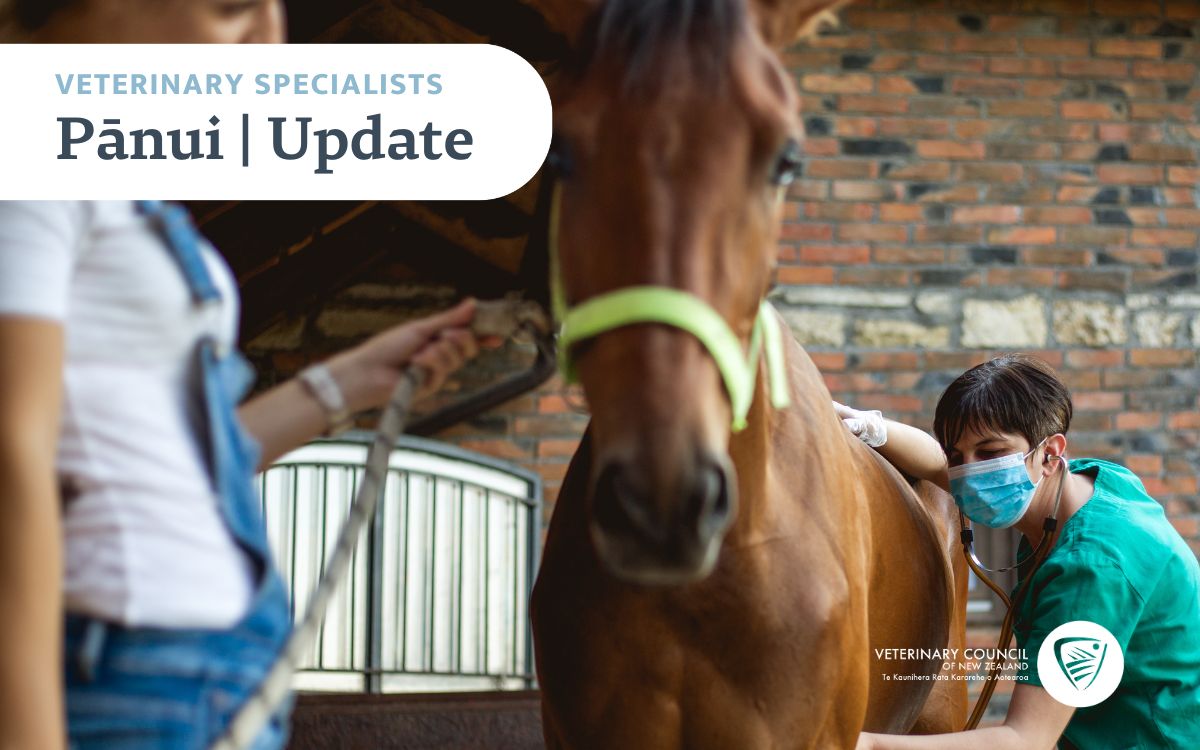
Specialists Pānui June 2023
Welcome to the Veterinary Council of New Zealand pānui/update for veterinary specialists.
In this pānui, we have included the latest information on Section 29 medicines and the new Therapeutic Products Bill, and our next steps following the specialists’ survey we ran last year.
This is our first specialists’ newsletter, so we’re keen to know what you think and if there is anything you would like to see included next time. Please email us at [email protected]
Update on section 29 medicines and the new Therapeutic Products Bill
Veterinarians have long faced an issue with the Medicines Act 1981 because it prohibits the supply of medicines that do not have ministerial consent. While there is an exemption for doctors in section 29, there is no exemption for veterinarians.
There are unconsented medicines which are required for some aspects of veterinary practice (see VCNZ’s list here ). While there is a workaround involving getting import approval from the Ministry for Primary Industries (MPI), this is not a complete solution and the “section 29 medicines” issue remains a significant problem.
VCNZ has worked with the Ministry of Health and MPI since the issue was identified and was involved in the early drafting of the Therapeutic Products Bill to ensure that the drafters were aware of the issues veterinarians were facing. Unfortunately, progress on this large and complex Bill was slow and the outbreak of COVID-19 did not help its progress.
However, the Bill is now before Parliament and, as currently drafted, it removes the section 29 medicines issue. Specifically:
- Clause 67 prohibits import, supply and export of a medicine (or medical device) if it has not been authorised (the new version of being consented).
- Clause 69 prohibits a range of activities, including manufacturing, wholesale and non-wholesale supply, exporting, dispensing, prescribing and administering medicines.
- Clause 93 gives veterinarians permission to supply a medicine or medical device (non-wholesale) whether or not it is authorised (so regardless of clause 67), if:
- It is not authorised, the special case requirement is met
- Compounding is required, and the legal requirements around compounding are met
- They supply it to a patient or another veterinarians patient at that veterinarian’s request
- Clause 94 allows for prescribing medicines, whether or not they are authorised, provided similar requirements to clause 93 are met.
- Clause 95 does the same for administering and clause 96 does the same for dispensing.
- Clause 98 allows for veterinarians to import a medicine or medical device that is not authorised if it is for a patient to whom they are allowed to supply (their patient or another vet’s at their request) and provided compounding is not required.
- The special case requirement is met if a veterinarian is satisfied that, in their professional judgment:
- There is no available medicine or medical device with authorisation that is suitable to meet the patient’s clinical needs (including off-label use)
- It is appropriate to carry on the activity with that medicine or device.
It’s not yet clear when the Bill will come into force but it is progressing well through the Parliamentary process.
VCNZ Specialists’ survey
Last year, VCNZ conducted a survey for veterinary specialists and shared the results with you at the time. Based on the survey results, we have developed a work plan. This includes:
- Establishing a clear policy for dealing with concerns about misuse of the ‘specialist’ title, including criteria for taking action and what action we will take.
- Preparing and publishing more information on our website (and other channels) for the public about the role and status of specialists and how they fit into the veterinary care system.
- Producing guidance for primary care vets on the status of specialists, when and how to talk to clients to recommend a referral, and when and how to refer.
- Establishing a specific specialists’ newsletter. Initially, we will send it out twice each year but can adjust this based on the amount of engagement and information we have to share.
- Tidying up the public register of specialists including consolidating the list of specialities.
- Establishing a pathway for specialists to feed into VCNZ standards and guidance before they are finalised, potentially via a call for input in the specialists’ newsletter.
- A long term project to work with stakeholders (such as Massey University and referral clinics) to promote more local training of specialists.
- Creating guidance for specialists on how to address or raise concerns about general practitioner vets.
These initiatives are not ranked in order of priority and will need to be accommodated alongside other VCNZ work. We hope that they will yield positive changes for the profession and the public, and reassure you that we are actioning the feedback so many specialists took time to give us.
As we develop various aspects of the plan, things like the policy mentioned above, we will invite specialist input and feedback.